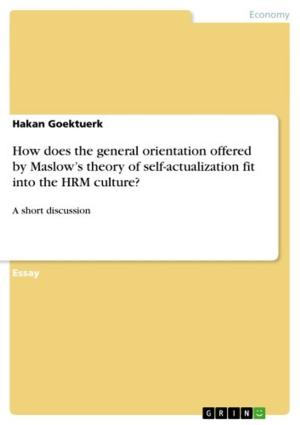Russia 1917 - on the failure of the Liberal Regime
on the failure of the Liberal Regime
Nonfiction, History, Asian, Asia| Author: | Martin Röw | ISBN: | 9783638373449 |
| Publisher: | GRIN Publishing | Publication: | May 3, 2005 |
| Imprint: | GRIN Publishing | Language: | English |
| Author: | Martin Röw |
| ISBN: | 9783638373449 |
| Publisher: | GRIN Publishing |
| Publication: | May 3, 2005 |
| Imprint: | GRIN Publishing |
| Language: | English |
Seminar paper from the year 2004 in the subject History - Asia, grade: B, University of Auckland (History), course: Pol 334- Between Anarchy and Chaos: Insurgencies, Terrorism and Counter-hegemonic Movements, 11 entries in the bibliography, language: English, abstract: In February 1917 the monarchy of the Romanovs ended. It left a vacuum of power in avast country. The most urgent question for Russia was who would fill the existing gap and how the problems shall be solved, which the country faced. The new liberal regime ended after only eight month by the Bolshevik overthrow. The opinions concerning the inevitability of the events are divided. Some scholar might argue that: 'No statesmen, no cabinet, even if possessed the quintessence of liberal wisdom and combined the talents of Gladstone, Cavour and Lloyd George could have achieved the goals the Provisional Government pursued.' On the other hand it seems wrong to accept that the development was predetermined. Actors and decisions affected the events crucially. The essay attempts to determine factors which contributed to the fall of the Februarian Regime. It tries to enlight the policy of the new regime in order to determine to which extent it could be made responsible for outcome. These policy as well as the emergence of the Bolsheviks as a power contender shall be examined. Therefore the focus will be put on the most crucial problems the country faced and the approaches which are provided to solve them. Dates are given using the older Russian way of counting.
Seminar paper from the year 2004 in the subject History - Asia, grade: B, University of Auckland (History), course: Pol 334- Between Anarchy and Chaos: Insurgencies, Terrorism and Counter-hegemonic Movements, 11 entries in the bibliography, language: English, abstract: In February 1917 the monarchy of the Romanovs ended. It left a vacuum of power in avast country. The most urgent question for Russia was who would fill the existing gap and how the problems shall be solved, which the country faced. The new liberal regime ended after only eight month by the Bolshevik overthrow. The opinions concerning the inevitability of the events are divided. Some scholar might argue that: 'No statesmen, no cabinet, even if possessed the quintessence of liberal wisdom and combined the talents of Gladstone, Cavour and Lloyd George could have achieved the goals the Provisional Government pursued.' On the other hand it seems wrong to accept that the development was predetermined. Actors and decisions affected the events crucially. The essay attempts to determine factors which contributed to the fall of the Februarian Regime. It tries to enlight the policy of the new regime in order to determine to which extent it could be made responsible for outcome. These policy as well as the emergence of the Bolsheviks as a power contender shall be examined. Therefore the focus will be put on the most crucial problems the country faced and the approaches which are provided to solve them. Dates are given using the older Russian way of counting.















